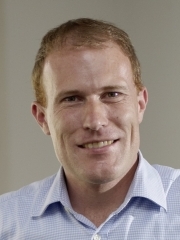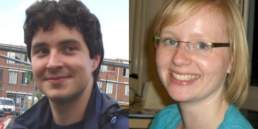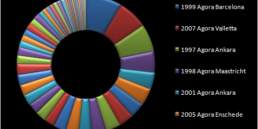AEGEE identity unknown. Difficult fund-raising. Programmes with limited outcome. More quality instead of quantity in the network. You think these are only problems of AEGEE 2012? No way, they are the recurring theme of the association. Below you find remarks about AEGEE’s state from 1994, written by AEGEE-Europe President Dorian Selz. 80 per cent of the content could also be written today. What does it tell us? Two things: first, solving these problems might be impossible. Second, there is nothing to worry about. Enjoy the document from AEGEE’s past!
AEGEE – THE PRESENT SITUATION (1994)
 One year away from our 10th anniversary, the situation of AEGEE stabilised itself after some turbulence last year. The current and the former CD worked hard to get results on various topics.
One year away from our 10th anniversary, the situation of AEGEE stabilised itself after some turbulence last year. The current and the former CD worked hard to get results on various topics.
At the present state our relations with organisations like the EU and the Council of Europe are very good. We were able to establish closer links with those institutions and receive today a considerable amount of support for our activities. But we have to continue to try to get more stable relations and use those contacts not only as source but also provide the results of our activities.
The financial part of an organisation like AEGEE is always very difficult. Fund-raising for an organisation like ours is arduous. Nevertheless we were able to get in touch with some companies and get them to know AEGEE a little better. A first step for a continuos relation. Public relations and the promotion of our organisation are very important to get in touch with the general public and inform them about the work we do. Efforts are being made to spread the ideas of the association in the really big European media.
Education was and remains one of the strengths of AEGEE. Our work to promote and to facilitate the education programmes Erasmus/Tempus is of great importance. However there is a lack of feedback from the locals and the association in general regarding the work in this field. We need a thorough reflection upon education and educational programmes. If AEGEE wants to remain a partner for these programmes a quick improvement of the quality of our contributions is needed. New initiatives are possible with institutions like the Council of Europe. European Projects are a part of the success story of AEGEE. But it is difficult keep the pace in those projects and to add promising new ones at the present stage. A lack of interest on the local level proves to be a high obstacle.
Over the past years the AEGEE-network saw a fast growth. Many new locals especially in the east joined the network. Today we have roughly 170 locals. The great (economic) disparities between the different parts of Europe prompt a lot of problems concerning their active participation. The communication in such a big network is another obstacle to master. Communication among the locals and from the European level to the individual (non-board) member is difficult. New initiatives and ideas shall narrow this gap.
Continuity and motivation are two keywords for us. We need more responsible and motivated people at all levels of the association and it is the task of all of us to not only organise brilliant events but to locate and promote our successors on every level of AEGEE.
AEGEE in General
The structures of AEGEE are apt to fulfil the wishes and needs of the organisation. We do not need to change them. But it the obligations and duties of being a part of AEGEE have to be emphasised. Good preparation for the internal meetings is necessary.
The aims of AEGEE seem to be sometimes vague, especially for new members and the non-AEGEE world. The Yearplan helped to clarify what we want to achieve. However too many times there is a lack of output of our activities. The output is the result of the input (our events) and consists of conclusions, results, evaluations of conferences, internal meetings, external meetings, discussions and seminars. Too often there is nothing at all coming out of those events. And more and more people in the outside world start to see AEGEE as bottomless.
AEGEE is implanted in an environment that changes. The different European societies get more and more consumer orientated. Young people loose the interest to work voluntarily for an organisation like ours. We have to inform what we want, what AEGEE stands for. Other students’ initiatives face similar difficulties. Informal links may help to locate and overcome those problems.
After a period of rapid geographical expansion, first in the countries of the then European Union and in a second stage in the Eastern part of Europe and the EFTA countries we enter today a era in which further expansion becomes less viable. A lack of new projects within AEGEE is probably a sign of these change. The emphasis must be today reoriented away from quantity toward quality. Quality of our activities, quality of our network and at the base, the quality of our members.
It is our chance to us AEGEE as a tool to create a Europe according to our wishes and not to be confronted with a pre-set of expectations and rules set by others. Our idea is clear. We prompt co-operation and integration among European students. Our pragmatic approach creates a unique possibility to be the organisation to discuss what really interests European students and to be a precious partner for the outside world.
It is up to all of us to give new inputs and to model the association according to our wishes and needs. We hope that the 10th anniversary of our association may be the turning point and may be used to master this challenge of change.
On behalf of AEGEE-Europe,
Dorian Selz, President AEGEE-Europe
Binic, June 28, 1994
(Text parts highlighted by Gunnar Erth)
Related Posts
30th January 2017
The new brand identity
When you are alone for days or weeks at a time, you eventually become drawn to people. Talking to randos is the norm. I’ll never forget the conversation with the aquarium fisherman, forest ranger, and women at the Thai market. It’s refreshing to compare notes on life with people from vastly different backgrounds.


